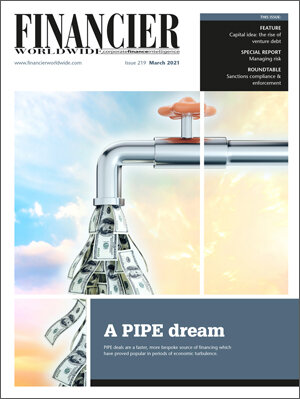Maximising enterprise value during times of distress
March 2021 | FEATURE | BANKRUPTCY & RESTRUCTURING
Financier Worldwide Magazine
Companies experience financial distress when they have difficulty or are unable to fulfil their financial obligations to creditors. These challenges may arise due to high fixed costs, illiquid assets, shrinking margins, high leverage, rising interest levels, or high customer or employee turnover, among others. Other issues may be outside a company’s control, such as technological or cultural shifts, economic downturns, geopolitical issues or, as we have seen over the last year, a global health crisis.
Due to the coronavirus (COVID-19) pandemic, we live in ‘challenging times’. Companies across from a wide range of industries, including manufacturing, transportation and retail, have suffered from extreme financial dislocation. The months ahead will likely consist of a slow-paced, uneven recovery across the board. During such times, companies and their C-suite face difficult decisions as they seek to balance the immediate needs of customers, employees and communities, and return to competitiveness.
Not only has COVID-19 presented an extraordinary humanitarian challenge, it has created an urgent need for businesses to find financial stability in an increasingly unstable environment. Companies have had to adapt their operations and increase resilience. They have sought to reengage with their workforce, reconsider supply chains, reduce operational risks and optimise customer access.
Given the uncertainty surrounding access to funding over the coming months, companies need to constantly review their capital requirements. While some advocate a ‘wait and see’ attitude, others are being more proactive. For any company experiencing financial difficulties or spiralling toward insolvency, restructuring debt may be one option, but only if underlying problems are addressed early.
Maximising enterprise value
For many companies, the upheaval caused by COVID-19 will have had a dramatic impact on their valuation. Businesses have suffered from declines or fluctuations in revenue, profitability and cash flow. Many have taken on additional debt offered through government schemes. Furthermore, general business risk has soared and financial reporting may reflect asset impairments.
“Not only has COVID-19 presented an extraordinary humanitarian challenge, it has created an urgent need for businesses to find financial stability in an increasingly unstable environment.”
As such, for companies hoping to attract an acquirer, the pandemic has made the challenge of maximising their valuation more arduous. Companies must identify possible strategic, financial and operational improvements as quickly and efficiently as possible to maximise enterprise value. Collecting outstanding debts to improve cash flow and reducing spending to shore up the balance sheet can also help during periods of distress.
When an organisation experiences a degree of financial distress, it needs to consider its strategic options take every step possible to implement key decisions, with pristine corporate governance. One of the first steps is to build a liquidity runway. The importance of a liquidity runway has become increasingly clear amid the economic reality of COVID-19. Established multinationals and ambitious young start-ups alike have discovered that liquidity is key to making it through the crisis. Cutting unnecessary expenses and rethinking business models to serve clients have become paramount.
While many governments have announced stimulus measures to support businesses and the economy, these measures will not last forever. Finances teams must manage cash proactively while supporting the needs of the business. As they implement these measures, management teams need to establish clear, honest communication channels with key financial and operational stakeholders. If they fail to do so, creditors and shareholders may take negative action which could have been avoided.
Valuing distressed companies
Valuing distressed assets is a complex process as financial challenges continue to mount globally. Many of the tried and tested valuation techniques are proving inadequate as there is so much uncertainty surrounding the current economy and the eventual ‘return to normal’. Projected cash flow, for example, can be difficult to determine for businesses that have been forced to close due to lockdown restrictions. In some countries, it is not yet clear when the economy will fully reopen, or when businesses such as airlines, hotels and travel agencies will be able to welcome back their customers.
Enterprise value is an important method for valuing a company in distress, as it considers factors that other calculations do not, such as the acquirer’s ability to pay off any outstanding debts of the target company while collecting any cash or cash equivalents owed to the target company. Simply put, enterprise value bypasses traditional company value calculations, such as market capitalisation, and provides a company’s aggregate value. It enables a would-be acquirer to ascertain the target’s true value and determine what it might cost, at a minimum, to buy the company. Scenario analysis and simulation of key business variables such as revenue growth, cash flow and profitability are commonly used for valuing distressed businesses.
The scale of the crisis has created – and will continue to create – opportunities for distressed investors as the pool of struggling assets grows. However, prevailing economic uncertainty may point to lower return assumptions, longer exit horizons and reduced cash flow, all of which will affect a valuation.
© Financier Worldwide
BY
Richard Summerfield

